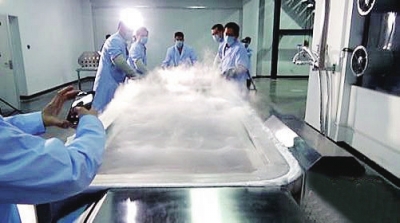


(Photo/Southeast Express)
Liu Jing, a researcher with the Chinese Academy of Sciences (CAS) says cryogenic technology can only preserve corpses and nothing much. He made the statement after China's first scientific cryogenic project was initiated in May.
Zhan Wenlian, a 49-year-old female who died of lung cancer on May 8 donated her body to China's first scientific cryogenic project initiated by medical company, the Yinfeng Academy of Life Science and Qilu Hospital, Shandong University.
Zhan's husband, Gui Junmin, hopes she would one day come back to life. He has also expressed his intention to donate his body to the project after he passes away.
Liu noted that human body cryopreservation is the ultimate goal for hypothermal medical studies. However, for now, it is merely a commercial activity that does nothing to revive the bodies except freezing them, Liu explained.
It is possible for scientists to notice resurgence in future as technology evolves, which will be one of the most significant scientific breakthroughs for mankind, Liu said. By then, humans will be able to break the limitation of lifespan and be able to take space travels. In addition, the technology can then be applied to stop ageing.
Scientists have successfully preserved various kinds of cells, but the survival rate varies from individual to individual. In addition, organs such as skins, corneas, livers and kidneys can also be preserved for short periods with cryogenic technology; but it takes more time to achieve long-term preservation.
Liu explained that difficulties still exist in the cryogenic preservation of larger organs and tissues. The temperature difference would cause lancinating trauma, and the ice crystals formed during the cooling process might pierce the cells, leading to irreversible damage.
A Chinese doctor who worked in a U.S. top transplantation organization said current technology is not able to preserve organs in the long run, let alone human bodies. He stressed that it is almost impossible to revive the dead in liquid nitrogen with modern technology.
Liu said he performed cryogenic tests on animals about 10 years ago, but the results were not very satisfying. However, he praised the innovative project by Yinfeng Academy of Life Science, saying it was of great significance.
 Fire brigade in Shanghai holds group wedding
Fire brigade in Shanghai holds group wedding Tourists enjoy ice sculptures in Datan Town, north China
Tourists enjoy ice sculptures in Datan Town, north China Sunset scenery of Dayan Pagoda in Xi'an
Sunset scenery of Dayan Pagoda in Xi'an Tourists have fun at scenic spot in Nanlong Town, NW China
Tourists have fun at scenic spot in Nanlong Town, NW China Harbin attracts tourists by making best use of ice in winter
Harbin attracts tourists by making best use of ice in winter In pics: FIS Alpine Ski Women's World Cup Slalom
In pics: FIS Alpine Ski Women's World Cup Slalom Black-necked cranes rest at reservoir in Lhunzhub County, Lhasa
Black-necked cranes rest at reservoir in Lhunzhub County, Lhasa China's FAST telescope will be available to foreign scientists in April
China's FAST telescope will be available to foreign scientists in April "She power" plays indispensable role in poverty alleviation
"She power" plays indispensable role in poverty alleviation Top 10 world news events of People's Daily in 2020
Top 10 world news events of People's Daily in 2020 Top 10 China news events of People's Daily in 2020
Top 10 China news events of People's Daily in 2020 Top 10 media buzzwords of 2020
Top 10 media buzzwords of 2020 Year-ender:10 major tourism stories of 2020
Year-ender:10 major tourism stories of 2020 No interference in Venezuelan issues
No interference in Venezuelan issues
 Biz prepares for trade spat
Biz prepares for trade spat
 Broadcasting Continent
Broadcasting Continent Australia wins Chinese CEOs as US loses
Australia wins Chinese CEOs as US loses